The manufacturing industry is undergoing many transformations due to the disruption caused by the pandemic, globalization and emergence of new technologies and digital collaboration tools. In this rapidly changing environment, manufacturers are looking for ways to improve collaboration and add agility to adapt to new market trends. In this article, we will talk about how Microsoft Teams can encourage collaboration and empower employees in the manufacturing industry.
Collaboration challenges in the manufacturing industry
Quality and safety
According to the Bureau of Labor Statistics, private industry employers reported 2.8 million nonfatal workplace injuries and illnesses in 2019 in the US. Following safety guidelines is vital for lowering the risk of injuries at the workplace.
Innovation
New technologies are revolutionizing all the industries, including manufacturing. These innovations are forcing workers to constantly learn new skills and adapt to new ways of working in to keep up with the evolution of technology.
Onsite operations excellence
These days supervising and assisting manufacturing workers often has to be done remotely. To do so efficiently, organizations require effective communication tools and advanced technologies that will make up for the lack of face-to-face interactions.
Agility
New market trends, changing laws and new technologies require manufacturing companies to rapidly adapt to these changes, i.e. be more agile. One of the ways to do address this challenge is by creating smaller teams that would be in charge of different stages of the production process. This way, each team will be more independent and efficient and the manufacturing process will take less time.
Processing customer requests
Excellent customer experience is becoming a core priority of any business these days. To resolve complex customer requests, however, especially when you sell to businesses, you may need to consult experts. Moreover, chances are it will have to be done remotely. Collaborating on these complex cases will require a digital solution that enables remote assistance and structured communication channels.
Laws and regulations
Due to globalization, trade wars and differences tax and compliance regulations in different parts of the world manufacturers have to always stay up to date on the changing laws in each country they operate in.
High turnover rate
The manufacturing industry has one of the highest turnover rates with 43% of the US companies reporting at least 20% annual turnover. One of the ways to attract, and keep valuable employees is by leveraging digital collaboration tools that will support remote working, make teamwork more engaging, and offer easy access to training resources and guidelines.
Microsoft Teams solutions that empower collaboration in manufacturing
Organized communication
Microsoft Teams is a canvas for effective teamwork. Teams and channels allow to structure communication, redirecting the focus on the most important points and keeping everyone on the same page. @mentions in the channel conversations will make sure the right people will not miss an important message, and delivery options will inform your team members about the urgency of the matter.
Private channels enable secure communication among specific team members on sensitive matters without the need to create a new team.
Microsoft Teams app offers a truly on-the-go communication, allowing users to work and stay in touch with their colleagues and other stakeholders anytime, anywhere. To make sure everyone in the team is available for a call, you can utilize Scheduling Assistant that will help you choose a time-slot suitable for all the required attendees.
Moreover, its Walkie-Talkie feature enables first-line workers use their smartphones as a walkie-talkie to promptly alert their team about a potential issue on the site.
:format(webp)/cdn.vox-cdn.com/uploads/chorus_image/image/66070402/walkietalkiemicrosoftteams.0.jpg)
Microsoft Cloud for Manufacturing
Recently, Microsoft introduced Microsoft Cloud for Manufacturing that will be available for public preview by the end of June.
It is designed to deliver capabilities that support the core processes and requirements of the manufacturing industry. These end-to-end manufacturing solutions include released and new capabilities that seamlessly connect people, assets, workflow, and business processes, empowering organizations to be more resilient.
Learn more about Microsoft Cloud for Manufacturing.
Guest access
If your manufacturing team needs to consult an independent expert to resolve a certain issue, collaborate with suppliers or negotiate with clients, Microsoft Teams is a perfect platform to do so. You can invite external users to your teams and even private channels to work together on the matters of mutual interest.
Shift management
To manage staff shifts on the manufacturing facility you can utilize Shifts app in Microsoft Teams. It facilitates shift scheduling and emergency covering. Your on-site workers can offer a shift, ask for a time off, suggest a swap and see upcoming shifts. Managers can leverage the app to send messages, videos and files to the entire shift or specific employees.

Task management
Any of your teams – be that sales and operations, on-site workers, customer support, engineers and others – can take advantage of Planner with Microsoft Teams to successfully manage all their tasks. This tool will help your staff better organize teamwork, promptly adjust to changes, track progress, and stick to deadlines. Additionally, Planner can be used to help employees better follow their training plans.
Microsoft Planner allows your users create and categorize task, assign them to individuals, add checklists and deadlines, configure priority levels and progress, and add links, files and comments.
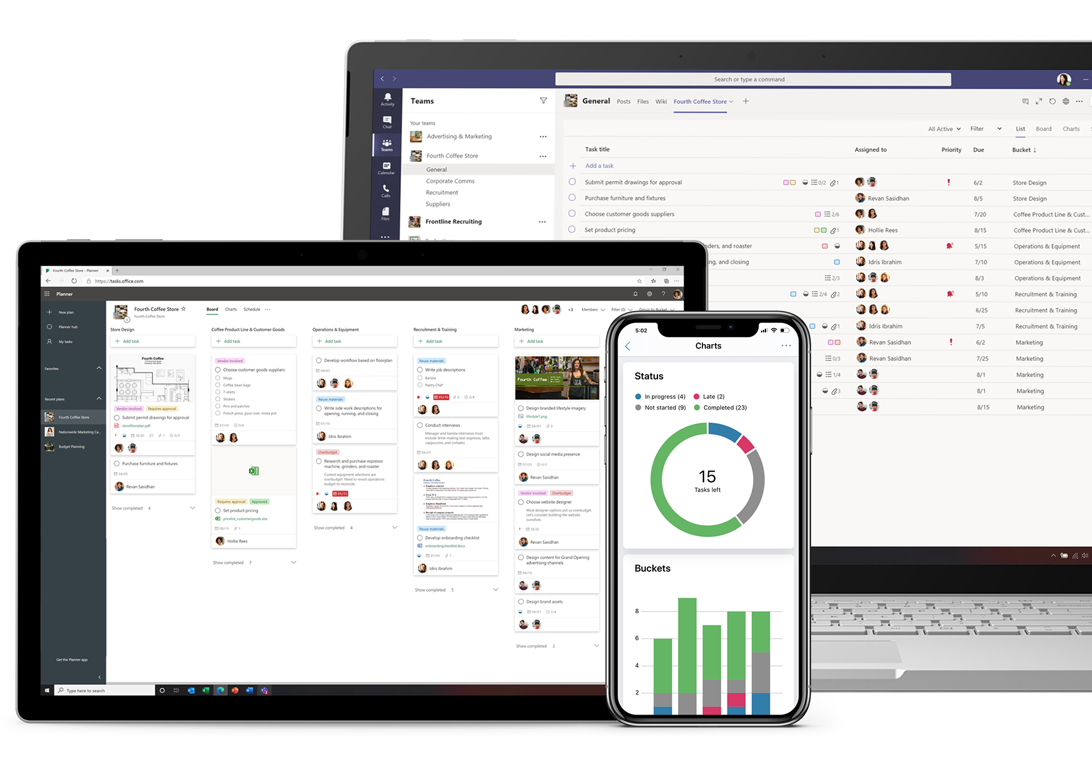
Remote assist
Your customer support team or employees on site may require assistance of experts from remote locations. My leveraging Dynamics 365 Remote Assist with Microsoft Teams they can share what they see in a instant, as well as walk through the process step-by-step with the help of a specialist, resolving issues real-time.
Effective collaboration
Microsoft Teams allows seamless integration with Microsoft, third-party and line-of-business applications, enabling organizations to solve their specific business needs. This brings teamwork to the whole new level, offering users to address any collaboration use case.
Try Teams integrations with Power Automate in order to automate routine and repetitive tasks and minimize the human factor; Forms to quickly and efficiently collect employee and customer feedback; Power BI to visualize data and make smart business decisions; SharePoint to create guidelines, instructions and keep all your documentation structured and up-to-date.
Microsoft Teams templates for Manufacturing
In order to use Microsoft Teams effectively, further improve collaboration across the entire organization and facilitate the process of teams creation you may want to use Microsoft Teams templates technology.
For each new product, a customer case, or a project that your organization undertakes your staff will need to create a new team. It will allow them to stay focused and be more agile.
At the same time, creating a new team from scratch can be very time-consuming. And this is where Microsoft Teams collaboration templates come in. With templates you will only need to build one team per specific scenario, add all the required channels, files and tabs with apps, owners and members, and then use this original team to create fully provisioned teams in just a few clicks.
You will no longer need to search for the required documentation across the organization and manually add all the channels and apps. Plus, you can establish strong governance policies that wouldn’t affect end-user experience.
To show you how it works we will present a few examples.
Onsite Operations template
If your company has multiple facilities in different locations, you can create Onsite Operations template and use it to create standard teams for each site.
Channels
You may want to add such channels as
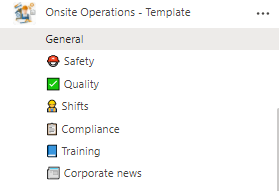
- Quality
- Safety
- Compliance
- Shifts
- Training
- Corporate news
Channels will help your team members structure and direct their conversations.
Files and tabs
It will be useful for your first-line employees to have fast and easy access to the safety guidelines. You can create them in a SharePoint site and pin as a tab in your Safety channel.
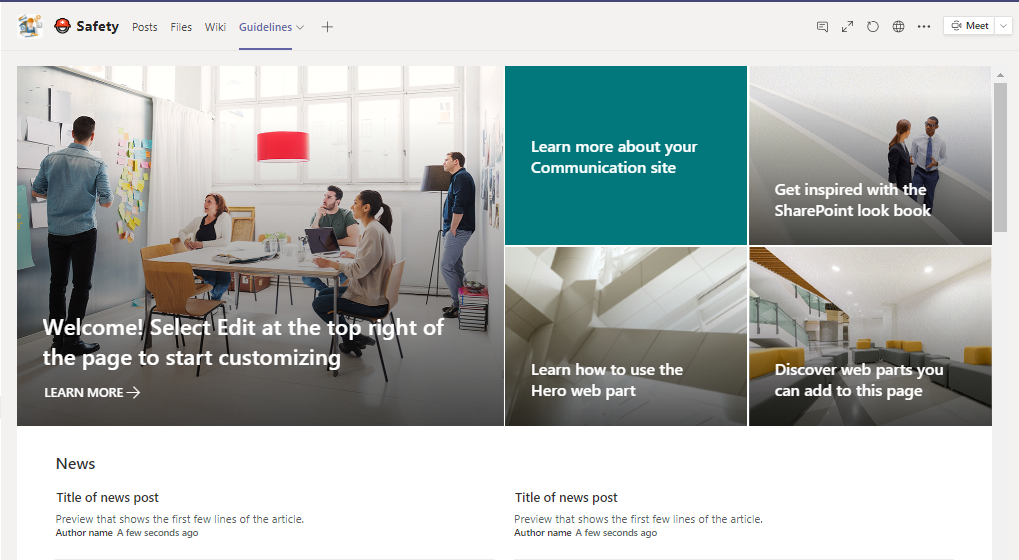
Additionally, you can create Planner and build tasks for training new workers, for familiarizing with safety regulations, and other.
Add Shifts app to manage employees and Yammer for keeping everyone informed about company’s news and announcements.
You can also upload all the necessary files and they will be automatically copied to all the newly created teams.
Customer Case template
In order to handle each customer request faster and more efficiently, create a Customer Case template and use it to build new teams with pre-build channels, files and tabs and pre-configured governance policies.
Channels
Possible channels for this template may be:

- Issue
- Solution and Implementation
- Analysis
- Customer communication
Files and tabs
Upload all the documentation that can be useful for case management teams. You can then pin the most important files as tabs in respective channels.
For example, you may add guidelines for issue resolution, product description, all previous customer requests, templates for issue description, etc.

Additionally, you can integrate any app that your team may require as a tab. For example, you can pre-build Planner with standard tasks, Power Automate, Power BI, or your own line-of-business application.
Project Management template
To manage any types of projects in your company, you can use Project Management templates.
Channels
You can build both standard and private channels for your teams. Private channels are best for working on highly confidential and sensitive matters such as legal discussions and budget.
Here are our examples of channel names:

- Legal – Contracts
- Budget
- Planning
- Business Case
- Steering Committee
- Contractors
- Team Meetings
Files and tabs
You can set up Planner with standard tasks for your projects, and integrate any project management tools that your organization uses.
You may also want to upload spreadsheets with your database, quality assurance guidelines, project requirements and other documentation.
Template creation
After you create your original teams, just go click on SalesTim app on your left toolbar and then select Catalog and +New template.

Then, choose a team you wish to clone. Let’s take our Project Management team as an example.
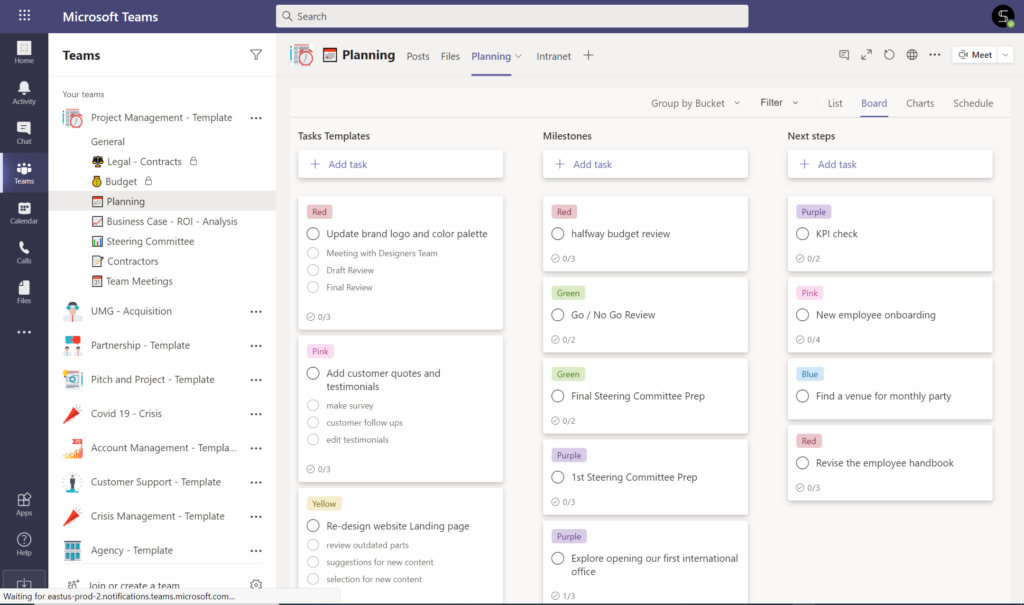
After you set up the necessary governance policies, click Save. Your template is ready!
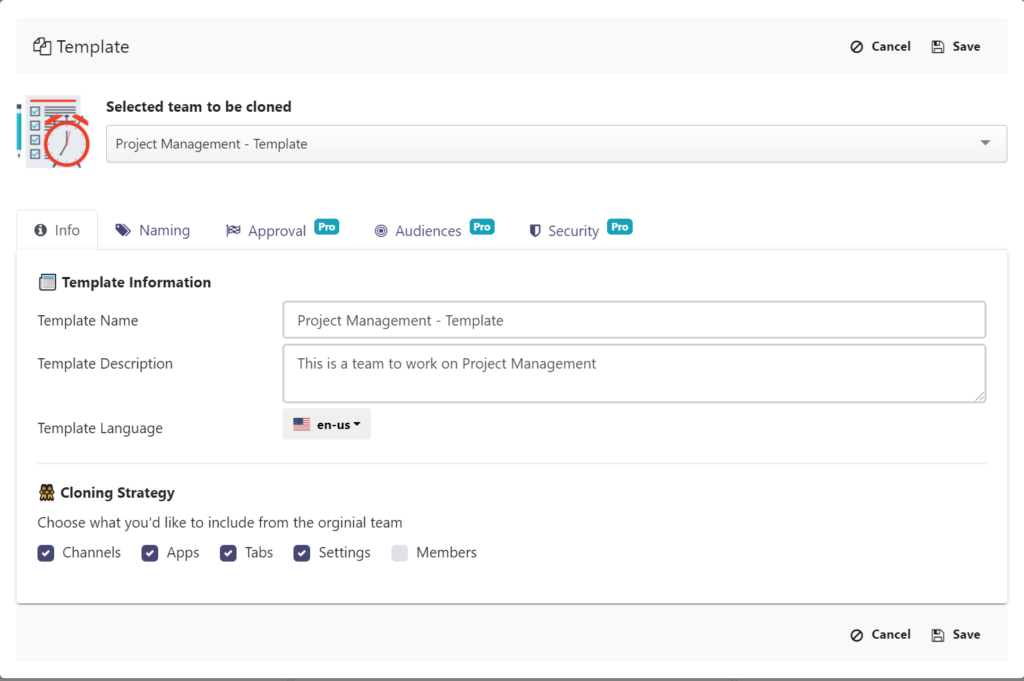
Governance policies
In addition to better user experience, Microsoft Teams Collaboration templates also offer a number of useful governance policies that answer the needs of the IT department.
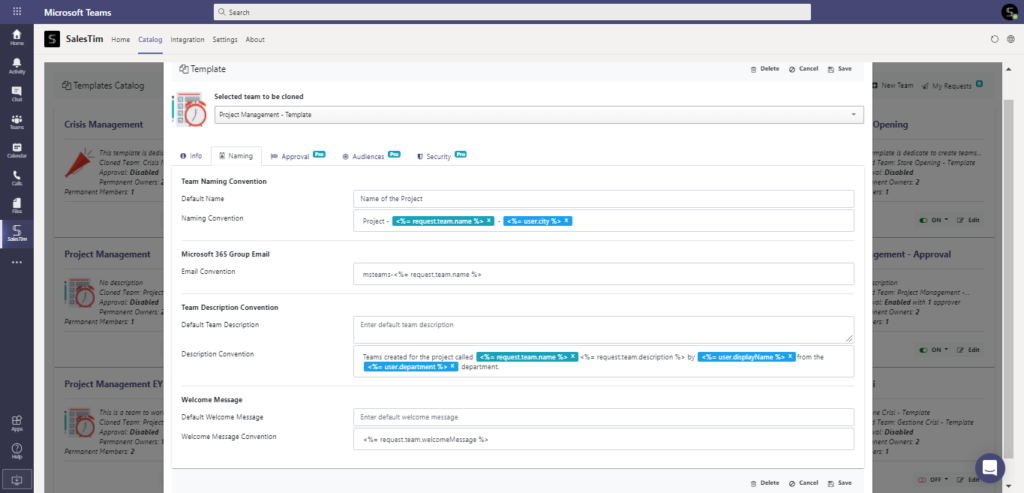
You can implement a Naming convention for your template, so that all the future teams created from it follow the same naming rules. For example, it may include the site location, for easier navigation among teams.
Additionally, you can set up Approval policies. This way, all the requests for creating teams from this template will require approval from particular person or a group of people from your organization.
You can also set up Audience targeting so that only specific groups of users could see certain templates.
Learn more about Microsoft Teams Collaboration templates governance policies.
Feel like your manufacturing teams could benefit from Microsoft Teams templates? Contact us and we’ll find a solution tailored for your use cases.
